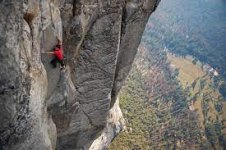I think there's something more going on here, too, which is that there is something in the meaning of climb Everest specifically that contributes to a complete action interpretation. We understand climbing Everest as a feat that has in itself the idea of successfully reaching the summit. If you were to substitute Everest with a mountain, your sentence wouldn't be so readily interpreted as a complete action, I don't think.
This thread has reminded me of Renaat Declerck's discussion of ontological aspect (a.k.a. lexical aspect, Aktionsart), specifically of his discussion of the telic–atelic distinction, in
The Grammar of the English Verb Phrase. He explains that a verb phrase is telic if it represents the situation it describes as tending toward an inherent point of completion, and atelic if it does not.
The verb phrases in
He climbed and
He climbed for three hours are atelic: they do not represent a situation with an inherent point of completion. In contrast,
He climbed Everest and
He climbed a mountain are telic: they do represent a situation with an inherent point of completion. The mountain having been climbed, be it Everest or any other mountain, the situation will have come to completion.
There are two tests that Declerck discusses for distinguishing between telic and atelic verb phrases. The first is that telic VPs can be, in substantive -
ing phrases, the complement of
finish or
complete. The fact that we can say
He completed climbing Everest and
He completed climbing a mountain is evidence that
climb Everest and
climb a mountain are telic VPs, and the fact that we can't (normally) say
?He completed climbing shows that
climb is an atelic VP.
The second test is that telic VPs can, unlike atelic VPs, be used in the construction
It takes/took/has taken/had taken . . . . to VP in such a way that the measure phrase measures the length of the situation. Thus we can have
It took him two days to climb the mountain, but not
It took him two days to climb; the latter would have to mean that the speaker required two days to
begin climbing, whether for lack of motivation or for some other reason.
Let's return, then, to the cat and the tree.
Climb the tree is a telic VP, as can be seen by the fact that we can say
The cat completed climbing the tree (it made it to the top) and
It took the cat thirty seconds to climb the tree. In contrast,
climb up the tree is an atelic VP, as can be seen by the fact that it sounds strange to say
?The cat completed climbing up the tree and
?It took the cat five minutes to climb up the tree (presumably, it pondered the climbing at length).
Of course, I am presupposing that
up the tree is a prepositional phrase indicating the direction of the climbing. I worry, however, that there may be an alternative parsing on which
up is an adverbial particle forming a phrasal verb with
climb, such that
climb up can itself be taken to be a verb with a direct object:
the tree. If that parsing is possible, then this would undermine atelicity and vindicate those who believe this discussion to be pointless here.


